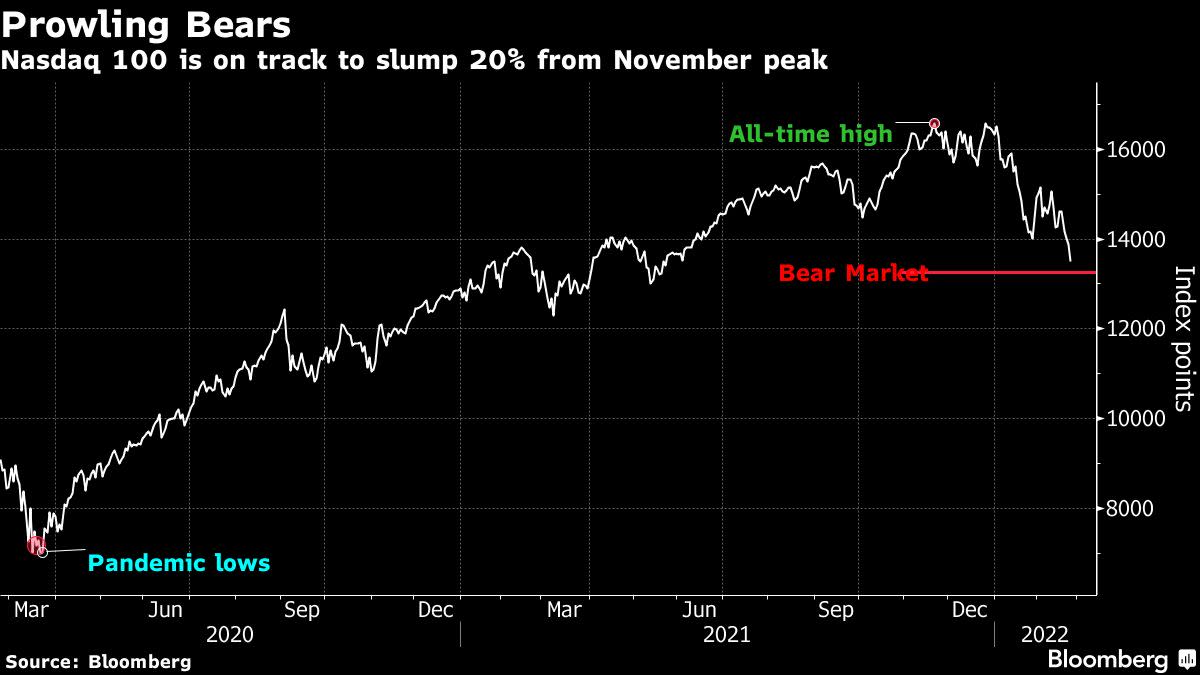Stagflationary Shock May Be Next for Plunging Stock Markets

(Bloomberg) — For equity markets, rising inflation was already a big concern. Russia’s attack on Ukraine means those worries just got a whole lot bigger.
Most Read from Bloomberg
Vladimir Putin’s move to invade his neighbor led to a surge in the price of everything from oil and food to natural gas and aluminum, spikes that could choke economic activity and exacerbate a market rout. The European Union and the U.S. are poised to announce Thursday new packages of sanctions that will curb trade between the West and one of the world’s largest commodity exporters.
Stocks across the world tumbled on the news, with major benchmarks in both Europe and the U.S. now firmly in correction territory and the Nasdaq 100 index entering a bear market.
“The effects of recent events can therefore rightly be described as stagflationary — rising prices with declining economic activity,” said Thomas Boeckelmann, head of portfolio management at Euroswitch, drawing parallels with the malaise that hit equity markets in the 1970s.
Markets have already been roiled this year by signals from Federal Reserve and the European Central Bank that they will tighten policy more aggressively than expected in an effort to tame inflation. Any further pressure on prices can only serve to heighten such concerns.
“This is coming at a really bad time for markets, because for the last year we have been trying to grapple with tightening conditions,” Goldman Sachs Group Inc. strategist Christian Mueller-Glissmann said in a Bloomberg TV interview on Thursday. “And now you’re dealing with a growth shock, particularly for Europe but pretty much globally.”
With interest rates at rock bottom, and asset purchases maxed out, central banks have little room for maneuver right now. Extending or strengthening stimulus measures may exacerbate price pressures, while stepping on the brakes may sharpen the slowdown, while doing little to address the roots of the inflationary spike.
“It will be extremely difficult for central banks to manage a situation where inflation is rising, but growth is also in danger,” Fidelity International market strategist Carsten Roemheld said by phone. “This is not a good environment to expect a quick recovery for stocks.”
European equities look to be the most vulnerable. “The crisis in Ukraine is showing the fragility of the European economies, in the sense that they are dependent on everything, starting from energy,” said Alessandro Tentori, chief investment officer at Axa Investment Managers. “This fragility could turn out to be negative for the relative performances of Europe, versus China and the U.S. in particular.”
Finding Opportunities
Still, optimists believe that the worst can be averted and say the knee-jerk reaction to the unfolding military standoff may create opportunities for investors able to hold their nerve.
“We’re not saying go out shopping everything that’s down today immediately, but in such a large scale event there will for sure be overreactions and opportunities to buy attractive assets under their long-term fair value,” said Oliver Scharping, portfolio manager at Bantleon.
Grounds for Optimism
For Tai Hui, chief Asia market strategist at JPMorgan Asset Management, grounds for optimism include consumer savings accumulated over the pandemic, and the fact that U.S. and European consumers now spend less of their disposable income on the basics, such as food and energy.
“While a sharp rise in food and energy prices would still represent a drop in disposable income, it doesn’t have to be detrimental to overall consumption,” Hui said. “Stagflation risk should be manageable if timely supply solutions can be found to deal with the disruptions” caused by the Ukraine conflict, he said.
(Updates with sanctions risk in second paragraph, Nasdaq price move in third)
Most Read from Bloomberg Businessweek
©2022 Bloomberg L.P.




